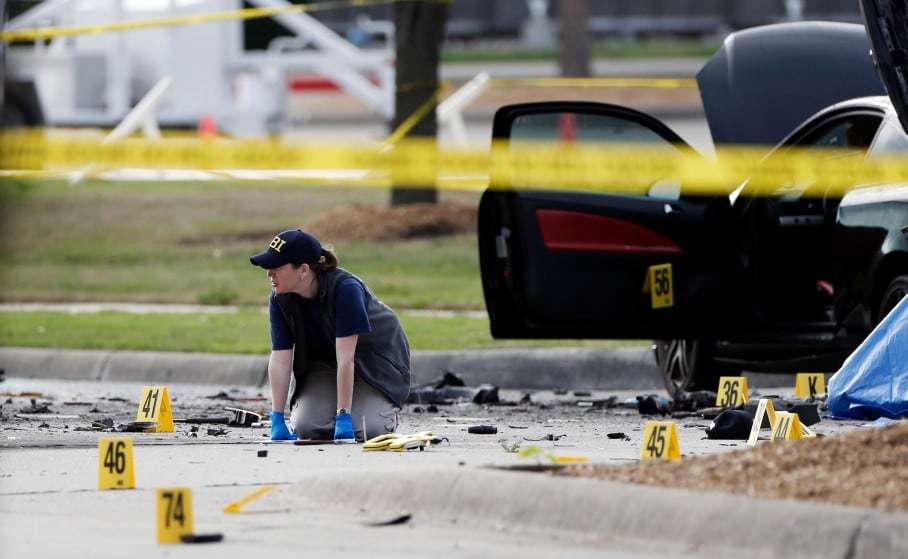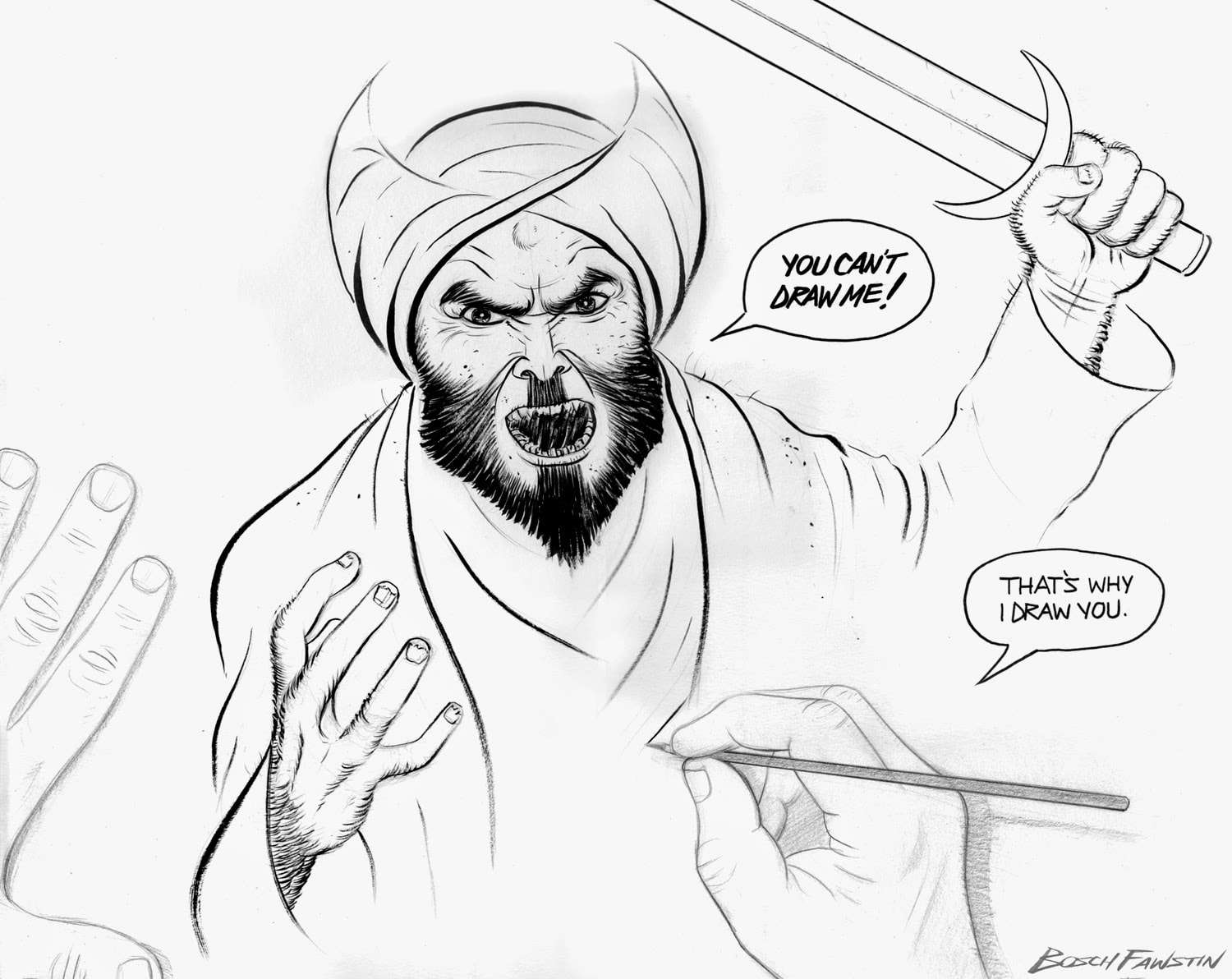The Volokh Conspiracy
Mostly law professors | Sometimes contrarian | Often libertarian | Always independent
Islamo-non-phobia, and the value of defiance

Two apparent would-be jihadists drove to the Texas Muhammad cartoon drawing contest and opened fire. They wounded a security guard, who is expected to survive; they were shot dead by police.
Unsurprisingly, the organizers of the event - the American Freedom Defense Initiative, which has long been sharply critical of Islam - are being criticized for their "provocative" actions. Here, for instance, is a Twitter message from New York Times' Rukmini Callimachi:
Free speech aside, why would anyone do something as provocative as hosting a "Muhammad drawing contest"?
This reminds me of the old joke: "Other than that, Mrs. Lincoln, how was the theater?" There is no "free speech aside" here.
But beyond this, I think there is a special kind of exercise of free speech here: speech as defiance. The organizers are sending a message that they are not afraid, either of those who would condemn us or even of those who would kill us - at least not so afraid that they will forgo their First Amendment rights.
Harsh critics of Islam are often accused of "Islamophobia"; and while the suffix "-phobia" means "aversion to" as well as "fear of," I think "-phobia" terms usually convey (and are often intended to convey) an allegation of irrational fear. Well, the critics say, our fear is actually quite rational; it makes sense to rationally fear dangerous ideologies. But with events such as this, I think the critics are saying: it is those who condemn us for being "provocative" who are relying on fear of Muslim extremists, and we are the ones who actually act contrary to the counsel of fear. The winning cartoon (which got both the "people's choice" prize and the jury prize at the contest) reflects that:

A different, more earnest and perhaps less catchy sort of defiance than that from Charlie Hebdo, and many of the original cartoons struck me as wittier. (Hey, everyone's a critic.) But the message is pretty clear - and it's an important message to have out there.
I disagree with much that the harsh critics of Islam assert; for instance, I have publicly and in detail disagreed with much of the "creeping Sharia" argument, and argued that many supposed instances of Islamic law intruding on the American legal system are actually entirely sensible applications of longstanding American legal principles. (See, for instance, many of the posts in this thread, many of the posts in this one, this National Review Online article, and this Oklahoma Law Review article.) But I see the value of such gestures of defiance - even when the gestures do carry real risk, including to the speakers, to those whose job is to protect them, and even to bystanders.
Let me close with a very different story, but one that I think reminds us of the many contexts in which defiant speech - or, here, symbolic expression - can take place, of the dangers it poses, and of the value of legally protecting it. The story was litigated before the Alaska Supreme Court in Hurn v. Greenway (Alaska 2013), and it began this way:
Simone Greenway and her friend Carrie Randall-Evans were dancing together in a suggestive manner and teasing Jeffrey Evans, Carrie's husband, when Jeffrey left the room, returned with a pistol, and shot everyone inside, killing Carrie. He then shot and killed himself. David Hurn, the father of Carrie's two minor children, sued, claiming that Greenway's participation in the dance was negligent either because it breached her duty as homeowner to control her guests or because it created a foreseeable and unreasonable risk of violence.
The court held for the defendant, "[b]ecause property owners generally have no duty to control the conduct of third parties in their homes, and because murder was not the foreseeable result of suggestive dancing." Yet there really was a good deal of reason to think that some such attack was "foreseeable" - there often is, with abusive spouses (or adherents of abuse-promoting ideologies, such as extremist Islam):
Greenway knew that Jeffrey had threatened Carrie with physical harm in the past; Carrie was afraid that Jeffrey would kill her; Jeffrey was a jealous man; on the night of the murder Jeffrey sometimes wore a "stone cold expression" that betrayed no emotion; and prior to Greenway's dance, he had issued a veiled threat: "What would you girls do if someone came in that door right now, after you?"
So I think the court was really motivated by something expressed in a different part of the opinion - a part that discusses the value of defiance, and indeed applies even when one is defying violence that is quite foreseeable:
Hurn asks us to reduce domestic violence in this state by imposing a duty to "refrain from teasing or bullying someone known to be potentially violent." But we refuse to give victims the duty to prevent their own abuse and then hold them liable when they fail.
The record suggests that Jeffrey was an abusive husband. And if Greenway is liable for taunting an abusive husband, it follows that victims themselves may be liable for provoking their partners if the result is harm to a third party.
Some courts have already been asked to hold a recipient of domestic abuse liable under § 302B for the crimes of her partner. The Iowa Supreme Court held that a woman was not liable for the actions of her jealous and abusive boyfriend after he assaulted another man she brought home. [Footnote: See Fiala v. Rains, 519 N.W.2d 386 (Iowa 1994); cf. Wilkins v. Siplin, 13 Cal.Rptr.2d 634 (Cal.App.1992) (holding that a wife could be liable for inviting a co-worker to a remote cabin where he was attacked by her husband) (depublished by order of the California Supreme Court).]
These requests are particularly troubling where, as here, the "provocation" is an act of resistance. [Footnote: The sparring, dancing, and teasing at issue were a direct response to Jeffrey's not-so-veiled threat to Carrie and Greenway's physical safety: "[W]hat would you girls do if somebody came in that door right now, after you?" In response, Carrie and Greenway laughed, gave each other a high five, said "[W]e'd kick his ass," and started sparring to demonstrate how they would repel the intruder. While they were sparring and dancing and laughing at Jeffrey, Greenway was [implicitly] expressing to Carrie: "[T]his is my domain, you don't have to be afraid here."]
We reject the idea that victims are responsible for the violence they endure in the home, and we will not blame them for their otherwise reasonable actions simply because those actions foreseeably result in violence.
Naturally, there are many differences between the Texas attack and the incident in Alaska (for instance, between claims of moral responsibility and claims of legal responsibility). But I think there's a structural similarity there nonetheless: a similarity that helps to express the value, moral, legal, and social, of defiant expression, whether in people's personal lives or their political lives.
For an approach that is in many ways the opposite of the Alaska Supreme Court's, and one that I think is incorrect, see Touchette v. Ganal (Haw. 1996). For the thoughts of Nick Gillespie, editor-in-chief of Reason.com, see here (I found the Callimachi tweet through the Reason piece). For more on just how tame many of the original Muhammad cartoons were - tame under any secular standard of fairness, as opposed to a standard that members of some religion might want to impose on others - and thus how much speech would really be lost if people avoid "provocative" speech of this sort, see here.
UPDATE: I also disagree with the Council on American-Islamic Relations on many things, but at least part of this statement on the attacks strikes me as quite right:
[V]iolence in response to anti-Islam programs like the one in Garland is more insulting to our faith than any cartoon, however defamatory.
Indeed, it is the violent retaliation prompted by the cartoons (and by similar speech) that "defames" Islam in the sense of injuring its reputation - and not just insulting it - much more than the cartoons themselves do.


Show Comments (0)